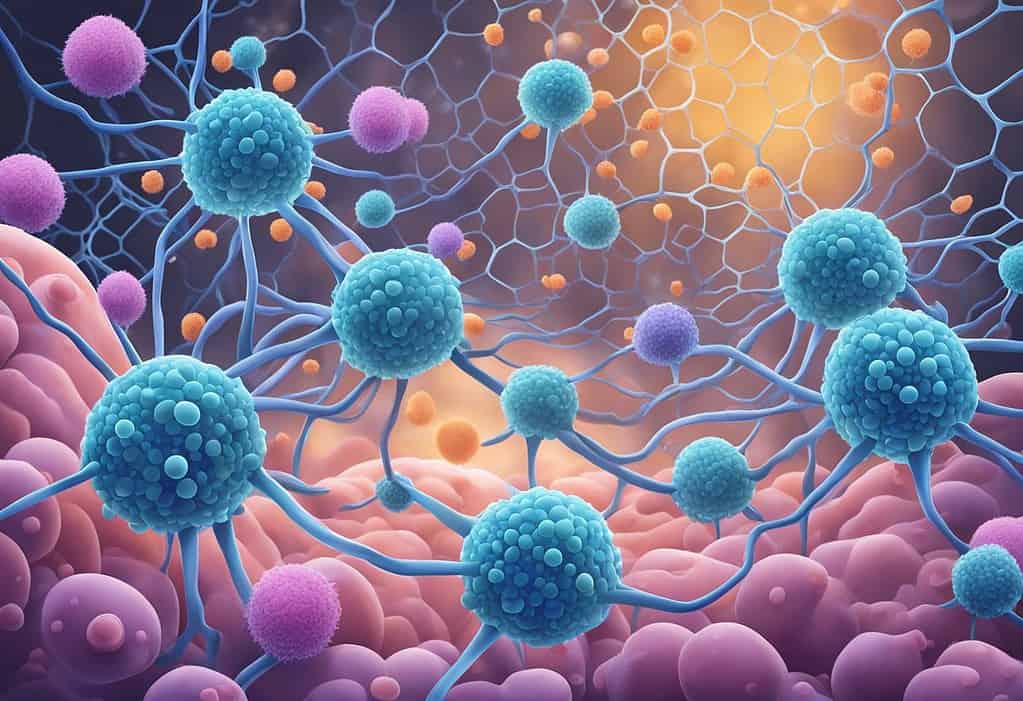Sleep is essential for maintaining good health and well-being. It is a vital process that allows our bodies to rest and recover after a long day. But did you know that sleep also plays a critical role in our immune system? In this article, we will explore the relationship between sleep and the immune system, and how sleep deprivation can impact our overall health.
Our immune system is responsible for protecting our bodies against harmful pathogens, such as viruses and bacteria. It is a complex network of cells, tissues, and organs that work together to identify and destroy foreign invaders. However, the immune system is not always active. It is regulated by a complex set of signals that are influenced by various factors, including sleep. Studies have shown that sleep plays a crucial role in regulating immune function, and that sleep deprivation can have a significant impact on our body’s ability to fight off infections.
Key Takeaways
- Sleep is an essential process that allows our bodies to rest and recover.
- The immune system is responsible for protecting our bodies against harmful pathogens.
- Sleep plays a critical role in regulating immune function, and sleep deprivation can have a significant impact on our body’s ability to fight off infections.
Sleep-Immune System Relationship
The relationship between sleep and the immune system is bidirectional and complex, with each system influencing the other in multiple ways. In this section, we will explore the two main aspects of this relationship: bidirectional communication and circadian rhythm effects.
Bidirectional Communication
Sleep and the immune system are closely intertwined, with sleep having a significant impact on immune function and vice versa. During sleep, the immune system releases cytokines, which help to fight off infections and inflammation. In turn, the immune system also modulates sleep, with immune activation leading to increased sleep intensity and duration.
However, disruptions to sleep can also have negative effects on immune function. Chronic sleep deprivation has been linked to increased inflammation, reduced immune cell activity, and decreased vaccine efficacy. Sleep disturbances, such as those experienced in sleep apnea, have also been associated with immune dysfunction and increased risk of infection.
Circadian Rhythm Effects
The circadian rhythm, which is regulated by the suprachiasmatic nucleus (SCN) in the brain, also plays a crucial role in the sleep-immune system relationship. The SCN helps to synchronize the timing of sleep and immune function, ensuring that immune activity is highest during the times when the body is most vulnerable to infection.
Disruptions to the circadian rhythm, such as those experienced during shift work or jet lag, can have significant effects on immune function. Studies have shown that shift workers have increased inflammation and reduced immune cell activity, while jet lag has been associated with increased susceptibility to infection.
In conclusion, the relationship between sleep and the immune system is complex and bidirectional, with each system influencing the other in multiple ways. Disruptions to sleep and the circadian rhythm can have significant effects on immune function, highlighting the importance of maintaining healthy sleep habits for overall health and well-being.
Sleep’s Impact on Immune Function
Sleep plays a vital role in the regulation of immune function. It is during sleep that our immune system produces cytokines, which are signaling molecules that help fight off infection and inflammation. In this section, we will explore the ways in which sleep impacts immune function, including enhancement of immune defense, cellular and molecular effects, and specific immune components affected.
Enhancement of Immune Defense
During sleep, our immune system is better equipped to defend against pathogens. This is because sleep enhances the production of cytokines, such as interleukin-7 (IL-7), which is essential for the development and maintenance of T cells, a type of white blood cell that plays a crucial role in immune defense. In addition, sleep promotes the production of growth hormone, which is necessary for the growth and development of immune cells.
Cellular and Molecular Effects
Sleep also has cellular and molecular effects on immune function. It promotes the production of regulatory T cells, which help to prevent autoimmune diseases by suppressing the activity of harmful immune cells. Furthermore, sleep enhances the function of antigen-presenting cells, which are responsible for initiating an immune response to foreign substances.
Specific Immune Components Affected
Several specific immune components are affected by sleep, including cytokines, T cells, and TNF-alpha. Sleep deprivation has been shown to decrease the production of cytokines, such as IL-6, which is involved in the regulation of inflammation. It also impairs the function of T cells, reducing their ability to fight off infections. Additionally, sleep deprivation increases the production of TNF-alpha, which is involved in the regulation of inflammation and immune response.
In conclusion, sleep plays a critical role in the regulation of immune function. It enhances immune defense, has cellular and molecular effects, and affects specific immune components such as cytokines, T cells, and TNF-alpha. By prioritizing good sleep habits, we can support our immune system and promote overall health and well-being.
Sleep Deprivation and Immune System
Lack of sleep can have a significant impact on our immune system. In the short term, sleep deprivation can weaken our immune response, making us more susceptible to infections and illnesses. In the long term, chronic sleep deprivation can lead to serious health consequences.
Short-term Effects
Studies have shown that even a single night of poor sleep can affect our immune system. When we don’t get enough sleep, our body produces fewer cytokines, which are proteins that help fight off infections and inflammation. This means that our immune system is less effective at responding to threats, leaving us more vulnerable to illness.
Sleep deprivation can also increase the production of stress hormones like cortisol, which can further suppress our immune response. This can lead to a vicious cycle where poor sleep leads to increased stress, which in turn makes it harder to sleep well.
Long-term Consequences
Chronic sleep deprivation has been linked to a range of health problems, including an increased risk of heart disease, diabetes, and obesity. It can also have a significant impact on our immune system, leading to a chronic state of inflammation that can contribute to a range of diseases.
One study found that people who slept less than six hours per night were four times more likely to catch a cold than those who slept for more than seven hours. Another study found that people who slept less than six hours per night had a 70% higher risk of developing hypertension than those who slept for seven to eight hours.
Conclusion
In conclusion, sleep deprivation can have a significant impact on our immune system, both in the short term and the long term. To maintain a healthy immune system, it’s important to prioritize good sleep habits and seek treatment for any sleep disorders or conditions that may be interfering with our ability to get restful sleep. By taking care of our sleep, we can help protect our overall health and well-being.
Immune System’s Effect on Sleep
When we think about the immune system, we often focus on how it helps us fight off infections. However, did you know that the immune system also plays a critical role in regulating our sleep? In this section, we’ll explore how the immune system affects our sleep and what happens when we’re sick.
During Infection
During an infection, the immune system kicks into high gear to fight off the invading pathogen. This immune response can affect our sleep in several ways. First, it can cause us to feel more tired than usual, as the body redirects energy to fight off the infection. Second, it can disrupt our sleep patterns by causing us to wake up more frequently throughout the night [1].
One reason for this disruption is that the immune system releases cytokines, which are signaling molecules that help coordinate the immune response. These cytokines can also affect the brain, causing us to feel sleepy and fatigued [2]. In fact, some researchers have suggested that cytokines may be the link between sleep and the immune system, as they can both influence each other in a bidirectional manner [3].
Interestingly, the immune system may also play a role in regulating our sleep even when we’re not sick. For example, studies have shown that certain immune cells called T cells are more active during sleep, suggesting that sleep may help boost the immune system [4].
In conclusion, the immune system and sleep are closely intertwined, with each influencing the other in complex ways. While the immune system’s effect on sleep during infection may be disruptive, it’s important to remember that this response is a critical part of our body’s defense against pathogens. By understanding how the immune system affects our sleep, we can take steps to support both our immune system and our sleep habits.
Health Implications
Disease Risks Associated with Poor Sleep
We know that sleep plays a crucial role in maintaining a healthy immune system. When we don’t get enough sleep, our immune system can weaken, making us more vulnerable to diseases and infections. Studies have shown that poor sleep is associated with an increased risk of flu, viruses, HIV, and other infections [1].
In addition to infectious diseases, poor sleep has also been linked to an increased risk of mortality and chronic diseases such as hypertension, breast cancer, and cognitive impairment [2]. Sleep deprivation can also have negative effects on cognitive performance, making it difficult to concentrate and remember things [3].
Sleep is also an important prognostic indicator for many diseases. For example, poor sleep has been linked to worse outcomes for patients with chronic diseases such as diabetes, heart disease, and cancer [4].
Interestingly, the effects of poor sleep on disease risk can vary depending on age and gender. For example, studies have shown that poor sleep is associated with an increased risk of anxiety and depression in women, but not in men [5]. Poor sleep has also been linked to increased risk of infection in infants and elderly individuals [6].
In conclusion, poor sleep can have a range of negative health implications, including an increased risk of infectious and chronic diseases, cognitive impairment, and worse outcomes for many diseases. It’s important to prioritize good sleep habits to maintain a healthy immune system and overall well-being.
[1] Sleep Foundation [2] Nature [3] PubMed Central [4] PubMed Central [5] PubMed [6] PubMed Central
Preventive Measures
Maintaining good sleep hygiene is essential for a healthy immune system. Here are some recommended preventive measures that can help you improve your sleep quality and quantity.
Recommended Sleep Duration
The National Sleep Foundation recommends that adults get 7-9 hours of sleep per night, while children and teenagers require more sleep, ranging from 9-14 hours per night. It is important to note that sleep duration requirements can vary from person to person, and that some individuals may require more or less sleep than the recommended amount.
Sleep Quality vs. Quantity
While it is important to get enough sleep, it is equally important to ensure that the sleep you get is of good quality. Quality sleep is characterized by uninterrupted sleep, deep sleep, and REM sleep. Poor sleep quality can lead to sleep disorders such as insomnia, sleep apnea, and restless leg syndrome, which can negatively impact the immune system.
Sleep Hygiene Practices
Sleep hygiene practices refer to a set of habits and behaviors that can help improve sleep quality. Some recommended sleep hygiene practices include:
- Establishing a regular sleep schedule
- Avoiding caffeine, alcohol, and nicotine before bedtime
- Creating a sleep-conducive environment (e.g. dark, quiet, cool)
- Avoiding stimulating activities before bedtime (e.g. exercise, screen time)
- Practicing relaxation techniques (e.g. meditation, deep breathing)
By adopting these preventive measures, we can improve our sleep quality and quantity, which can in turn boost our immune system and overall health.
It is important to note that if you are experiencing persistent sleep problems, it may be beneficial to consult with a sleep medicine specialist or undergo a polysomnography test to evaluate sleep parameters and identify any underlying sleep disorders.
In summary, by prioritizing good sleep hygiene and adopting healthy sleep habits, we can improve our immune system and overall well-being.
Conclusion
In conclusion, we have seen how critical sleep is to maintaining a healthy immune system. Through our research, we have found that sleep deprivation can lead to a weakened immune system, making our bodies more susceptible to infections and diseases. On the other hand, getting enough sleep can enhance our immune defenses and help us fight off illnesses.
We have also learned that sleep and the immune system are closely intertwined. During sleep, our bodies produce cytokines, which are essential for fighting off infections and inflammation. Sleep deprivation can disrupt the production of these cytokines, leading to an increased risk of chronic diseases.
It’s important to note that there are many factors that can affect our sleep, such as stress, diet, and lifestyle habits. By adopting healthy sleep habits, such as sticking to a regular sleep schedule and creating a relaxing bedtime routine, we can improve the quality and quantity of our sleep.
Overall, we encourage everyone to prioritize their sleep health and take steps to improve their sleep habits. By doing so, we can support our immune system and promote overall well-being.
Frequently Asked Questions
How does adequate sleep contribute to the functioning of the immune system?
Adequate sleep is essential to maintain a healthy immune system. During sleep, the body produces and releases cytokines, a type of protein that helps the immune system fight off infections and inflammation. Lack of sleep can decrease the production of cytokines, which can make us more susceptible to infections and illnesses.
Can regular sleep patterns improve immune response to infections?
Yes, regular sleep patterns can improve immune response to infections. Consistent sleep patterns help regulate the production of cytokines, which are essential for fighting off infections. Additionally, regular sleep patterns can reduce the production of stress hormones, which can weaken the immune system.
What impact does sleep deprivation have on the body’s ability to fight illness?
Sleep deprivation can have a significant impact on the body’s ability to fight illness. Lack of sleep can reduce the production of cytokines, which can weaken the immune system and make us more susceptible to infections and illnesses. Additionally, sleep deprivation can increase the production of stress hormones, which can further weaken the immune system.
Are certain stages of sleep more important for immune system regeneration?
Yes, certain stages of sleep are more important for immune system regeneration. During deep sleep, the body repairs tissues and boosts the immune system. Additionally, during REM sleep, the brain is very active, and the body is paralyzed to prevent acting out dreams. Both deep sleep and REM sleep are essential for immune system regeneration.
How do cytokines released during sleep influence immune health?
Cytokines released during sleep play a crucial role in immune health. These proteins help the immune system fight off infections and inflammation. Adequate sleep is essential to maintain a healthy immune system, as it allows the body to produce and release cytokines.
Does the quality of sleep affect immune system resilience against diseases?
Yes, the quality of sleep affects immune system resilience against diseases. Poor sleep quality can reduce the production of cytokines, which can weaken the immune system and make us more susceptible to infections and illnesses. Additionally, poor sleep quality can increase the production of stress hormones, which can further weaken the immune system.



